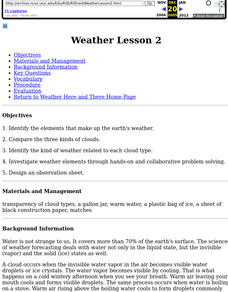Curated OER
Hot, Cold, Fresh and Salty
Pupils observe the effects of layering water and what is more or less saline than normal. In this geoscience lesson students create saline solutions, layer them and observe how the water becomes different temperatures in different layers.
Curated OER
Fuel Mystery Dis-Solved
Students describe how temperature and surface area exposure affect the rate at which fuel is consumed. They explain why engineers want to know about the properties of a fuel when designing rockets. They create a bar graph of result data.
Curated OER
Preventing Hypothermia
Students identify the causes of hypothermia. For this biology lesson, students investigate the different types of heat transfer and heat loss. They discuss several practical measures to avoid hypothermia.
Curated OER
Convection in a Pan
Students explore convection. In this lesson on heat and energy, students investigate how heat moves in convection currents. They use their finding to better understand how convection currents effect the movement of tectonic plates.
Curated OER
The Greenhouse Effect
Seventh graders investigate the temperature change in open and closed containers. In this earth science instructional activity, 7th graders relate this lab activity to greenhouse effect. They create a line graph from data collected in...
Curated OER
Nowhere to Run
In this environmental science instructional activity, students explore the different climate change around the world and summarize them. They fill in the table provided.
Curated OER
Human Impact on the Environment
In this environmental science worksheet, students complete a crossword puzzle with 26 questions about human impact on the environment.
Curated OER
Transfer of Thermal Energy
Students define temperature and heat, distinguish between temperature and heat flow, calculate amount of heat energy released or absorbed in chemical process, and design procedure, through experimentation, to gather and evaluate data to...
Curated OER
How Hot Is Hot In Namib?
Students research and demonstrate the temperatures of the Namibian Desert. They watch and discuss a video, conduct an experiment to demonstrate the desert temperatures, record their results in the form of a graph, and compare/contrast...
Curated OER
Mineral Mixtures
In this science worksheet, students use basic scientific concepts to complete the series of puzzles that are intended to increase science literacy for classifying types of rocks and minerals.
Curated OER
Ammonium Nitrate - Heat of Solution
Students quantify the relationship between temperature, energy and heat
and define an endothermic reaction. They measure the energy change caused by dissolving one mole of ammonium nitrate in water.
Curated OER
Is It Hot in the Light?
Third graders make observations about the temperature of items in direct sunlight. In groups, they discuss why asphalt, brick and cement are warmer than items surrounding them. To end the lesson, they examine how heat transfers energy...
Curated OER
Heat Transfer
Eighth graders form teams. Students place a thermometer in ball of clay and place in an insulated cup filled with hot water and then another thermometer in a ball of clay in an insulated cup of cold water. Students record temperature...
Virginia Department of Education
Metals, Nonmetals, and Metalloids
How can one easily classify metals, nonmetals, and metalloids? Pupils answer this question as they experiment with unknown substances and perform tests on conductivity, brittleness, and malleability to determine which unknown belongs in...
University of Georgia
Endothermic and Exothermic Reactions
Equip your chemistry class with the tools to properly understand endothermic and exothermic reactions. Young chemists collect, analyze, and graph data to determine how the Law of Conservation of Matter is applied to chemical composition...
Curated OER
Version 001 – Exam 1 – David Laude (53015) 1
A 30-question multiple choice chemistry test challenges takers. Topics touched upon include thermochemistry, equilibrium, behavior of gases, and pH. Problem solving is required in order to answer most of the questions. Other questions...
Curated OER
More Thermochemistry Problems
This two-page assignment covers basic thermochemistry concepts. Chemistry learners identify exothermic and endothermic processes, explain a phase change graph, and draw an energy level diagram. There are no problems to solve, just...
Curated OER
Gallery Walk Questions on Earth's Radiation Balance
Questions that can be used in a instructional activity on Earth's radiation balance are suggested in this resource. It is not a lesson plan, per se, but it is a list of questions for stations within a "Gallery Walk" instructional...
Curated OER
Weather Lesson 2
Students identify the elements that make up the earth's weather. Begin by having students pretend they are hiking along a mountain ridge. It's been sunny and warm all day, but you see a dark line of clouds moving from the west.
Curated OER
Physical and Chemical Reactions - Factors Which Affect Reaction Rate
A total of five experiments lead chemistry pros to understand the difference between physical and chemical change. They also experiment with exothermic reaction factors that affect rate of reaction. The procedures are not written in the...
Curated OER
Making a Thermometer
Students observe a demonstration of how a thermometer functions. They apply the scientific method while determining which of three cups hold the coldest water. They write a hypothesis before conducting the experiment and gather data.
Curated OER
Thermal Energy
In this thermal energy worksheet, students read 2 statements about thermal energy. Students write in the effect of the statements. This worksheet is a graphic organizer.
Curated OER
Solar Collectors
Students explore solar collection. In this solar energy instructional activity, students use two circles of white and black construction paper at the bottom of containers of water to investigate solar collection. Students record the...
Curated OER
Global Water Cycle & Heat Flow
Students experiment to discover how different variables affect the water cycle. They do hat flow experiments and construct a computer heat flow model.

























